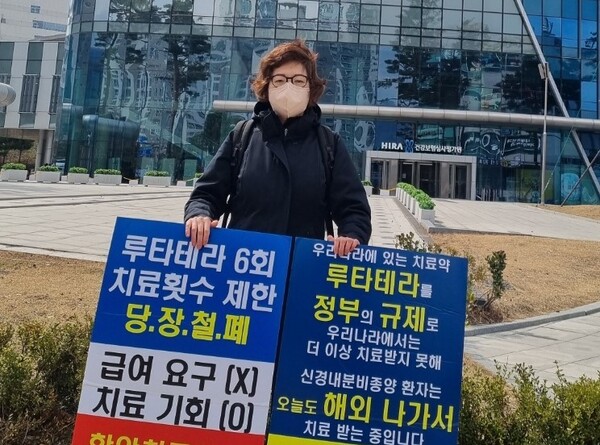"We're not asking for health insurance benefits. We are asking for the opportunity to be treated in Korea, even at our own expense."
Korean neuroendocrine tumor patients said so after the Health Insurance Review and Assessment Service (HIRA) said last Friday that it is difficult to lift the limit of a maximum of six treatments using the radiotherapy drug Lutathera.
The Korean Neuroendocrine Tumor Patient Association issued a statement on Thursday, reiterating their demand to change the treatment reality of neuroendocrine tumor patients who are forced to travel abroad for medical treatment due to the maximum six-treatment limit for Lutathera. Since Tuesday, the association has also staged a one-person protest in front of the HIRA headquarters in Wonju, Gangwon Province.

"We neuroendocrine tumor patients strongly urge the Ministry of Health and Welfare and HIRA to immediately remove the unnecessary regulation of limiting the maximum number of treatments of the neuroendocrine tumor drug Lutathera to six, and quickly improve the system so that patients suffering from stage IV cancer can safely receive treatment from Korean doctors without going to foreign countries," the association said.
Lutathera, a last-line treatment for stage IV neuroendocrine tumor patients, was approved by the Ministry of Food and Drug Safety (MFDS) in 2020. Since then, it has prolonged the lives of many patients and improved their quality of life. Lutathera is also highly preferred among patients due to its superior therapeutic effectiveness and fewer side effects compared to other anticancer drugs.
"However, Lutathera has a critical drawback in Korea," it said. “It is allowed only for a maximum of six doses -- four with health insurance benefits and two off-label uses 100 percent paid by patients.”
It would be great if cancer cells could be eliminated after six treatments of Lutathera, but the reality is different, it said. For this reason, patients with neuroendocrine tumors are being forced to travel to Malaysia, India, Germany, and the United States for treatment, even though Lutathera is available in Korea.
"Despite doctors' opinions that Lutathera treatment is urgently needed, HIRA blocks its prescription, so patients are forced to fly seven to 14 hours to Malaysia, India, Germany, and other countries to receive treatment from unfamiliar doctors with whom they cannot communicate and then fly back for a long flight," it said.
It's not uncommon for patients with neuroendocrine tumors to go on treatment trips and not return to their families alive.
"Last year, a representative of our association went on an expeditionary treatment abroad and never returned to us. As long as the government's restrictions remain in place, there is no guarantee that a tragedy like this will not happen again to patients traveling abroad," the patients’ group said, "The government should immediately remove the six-treatment limit on Lutathera to prevent this tragic situation from happening to its citizens."
On Jan. 26, the association posted a petition to the National Assembly calling for removing the restriction on the number of treatments of Lutathera, gaining the consent of 52,070 people and filing a complaint through the public petition system. Last Friday, however, HIRA sent what the group sees as an incomprehensible answer to the patients and the public, saying that it is difficult to lift the restriction on the number of treatments because of the approval details.
The association said that the government's decision to limit the number of Lutathera treatments to four is "understandable” because the drug is expensive. However, it added that the answer HIRA gave for limiting the 100-percent self-paid treatment to two -- failure to secure patient safety resulting from additional treatment -- was "too shabby."
"Is the government saying that other countries don't care about the health of their citizens and work only for the sake of pharmaceutical companies' profits by not imposing treatment limits?” the organization said. "We can easily find reports that patients' lives are prolonged with more than six treatments."
Noting that Lutathera has been approved and used in 40 countries worldwide and no other countries but Korea set limits to the number of treatments, the association said, “If a patient wants to, and the doctor has done a preliminary examination and the patient's health condition is suitable for treatment, the patient is allowed to be treated with Lutathera. No other country limits the number of treatments to deny its citizens the opportunity to be treated and to live a little longer."
Reiterating that neuroendocrine tumor patients still leave their home country in the hope of living one more day, the association called for a change in cancer treatment reality.
"We are frustrated, angry, and sad that our country does not provide treatment, but we have no other choice to control the growing tumor," it said. "Neuroendocrine tumor patients live in Korea, which is considered a medical powerhouse and a medical leader. In reality, however, they are in an absurd situation where they have to go to countries with worse medical services than Korea to receive treatment to prolong their lives."
In conclusion, the association said, “Immediately abolish the unjustified and incomprehensible regulation limiting the number of Lutathera treatments, which defies common sense and is not found anywhere else in the world, and do not further undermine Korea's reputation as a medical powerhouse in the international community by encouraging foreign source treatment. Please protect the human rights of Korean citizens so that they are not put in the tragic situation of having to go to a foreign country to beg for treatment."

